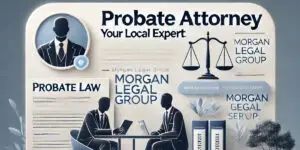Can I Put My House in a Trust Without a Lawyer in New York?
At Morgan Legal Group, located in New York City, we specialize in estate planning, probate, guardianship, elder law, wills, and trusts. One common question we encounter is whether it is possible to put a house in a trust without a lawyer. This guide will provide a detailed explanation of the process, considerations, and potential pitfalls of creating a trust for your house on your own under New York State law.
Understanding Trusts
A trust is a legal arrangement where one party (the trustee) holds property on behalf of another party (the beneficiary). Trusts can be used for various purposes, including estate planning, asset protection, and tax planning. Placing your house in a trust can help you manage your estate, avoid probate, and ensure that your property is distributed according to your wishes.
Types of Trusts
There are several types of trusts, each serving different purposes:
- Revocable Living Trust: Allows you to retain control over the trust assets during your lifetime and make changes as needed. The trust becomes irrevocable upon your death.
- Irrevocable Trust: Transfers ownership of the assets to the trust, and you cannot make changes without the beneficiary’s consent. This type of trust can offer tax benefits and asset protection.
- Testamentary Trust: Created through your will and takes effect upon your death.
- Special Needs Trust: Designed to provide for a disabled beneficiary without affecting their eligibility for government benefits.
The Process of Putting Your House in a Trust
Creating a trust for your house involves several steps. While it is possible to do this without a lawyer, it is essential to understand the process and potential challenges:
1. Choose the Type of Trust
Determine which type of trust best suits your needs. A revocable living trust is commonly used for estate planning purposes, as it allows you to retain control over your assets during your lifetime.
2. Draft the Trust Document
You will need to draft a trust document that outlines the terms and conditions of the trust. This document should include the following:
- The name of the trust
- The name of the trustee (you can name yourself as the initial trustee)
- The name of the successor trustee (the person who will manage the trust after your death or incapacity)
- The names of the beneficiaries
- The terms and conditions for managing and distributing the trust assets
While templates and online resources are available, it is crucial to ensure that the trust document complies with New York State law and addresses your specific needs.
3. Execute the Trust Document
Once the trust document is drafted, it must be signed and notarized. This step formalizes the trust and makes it legally binding.
4. Transfer the House to the Trust
The next step is to transfer ownership of your house to the trust. This involves preparing and signing a new deed that transfers the property from your name to the name of the trust. The deed must be notarized and recorded with the county recorder’s office where the property is located.
5. Update Insurance and Mortgage Information
If you have homeowners’ insurance or a mortgage on the property, you will need to inform the insurance company and mortgage lender of the transfer. They may require additional documentation or updates to the policy or loan agreement.
Potential Pitfalls of DIY Trusts
While it is possible to create a trust without a lawyer, there are several potential pitfalls to be aware of:
1. Legal Compliance
Ensuring that the trust document complies with New York State law is crucial. A poorly drafted or non-compliant trust document can lead to legal challenges and invalidate the trust.
2. Proper Transfer of Title
Transferring the title of your house to the trust must be done correctly. Errors in the deed or recording process can result in the property not being properly transferred to the trust.
3. Tax Implications
Transferring property to a trust can have tax implications. It is important to understand how the transfer will affect your property taxes, income taxes, and estate taxes.
4. Potential Conflicts
Without proper guidance, creating a trust can lead to conflicts among beneficiaries or issues with the administration of the trust. An experienced lawyer can help address these potential conflicts and ensure that the trust operates smoothly.
5. Ongoing Management
Managing a trust requires ongoing attention and compliance with legal requirements. Failing to properly manage the trust can result in legal and financial complications.
Benefits of Working with an Experienced Lawyer
While it is possible to create a trust without a lawyer, working with an experienced estate planning attorney can provide several benefits:
1. Legal Expertise
An experienced lawyer has the legal expertise to ensure that the trust document complies with New York State law and addresses your specific needs and goals.
2. Proper Documentation
A lawyer can ensure that all necessary documents are properly prepared, executed, and recorded, reducing the risk of errors or legal challenges.
3. Tax Planning
An estate planning attorney can help you understand the tax implications of transferring property to a trust and develop strategies to minimize your tax liability.
4. Conflict Resolution
A lawyer can help address potential conflicts among beneficiaries and ensure that the trust operates smoothly and efficiently.
5. Ongoing Support
Working with an experienced lawyer provides ongoing support for managing and administering the trust. This ensures that the trust remains compliant with legal requirements and operates according to your wishes.
How Morgan Legal Group Can Help
At Morgan Legal Group, we provide expert guidance and comprehensive legal services for all aspects of estate planning and trust creation. Our experienced attorneys are dedicated to helping you create a trust that protects your assets and ensures your wishes are carried out under New York State law.
Expert Guidance
Our team of experienced attorneys has a deep understanding of New York State estate planning laws. We provide expert guidance to help you navigate the complexities of creating a trust and making informed decisions.
Personalized Service
We take the time to understand your unique situation and develop a customized legal strategy that meets your needs. Our personalized approach ensures that your trust reflects your wishes and protects your interests.
Comprehensive Legal Solutions
From drafting trust documents to managing the transfer of property, we offer a wide range of services to address all aspects of trust creation and estate planning. Our goal is to provide you with a seamless and stress-free experience.
Contact Us
If you are considering placing your house in a trust, contact Morgan Legal Group today. Our experienced attorneys are here to provide you with the expert legal assistance you need. Schedule a consultation with us and take the first step towards securing your future and protecting your assets under New York State law.









